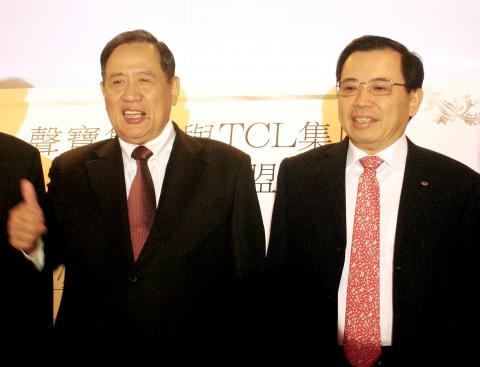Home appliance maker Sampo Corp (聲寶) is making a foray overseas by linking up with China’s TCL Corp to sell its TVs in China, with the prospect of deepening cooperation as its new partner might make an investment in Sampo.
Sampo yesterday announced a strategic partnership with TCL — China’s leading consumer electronics maker, which produces TVs, air conditioners and cellphones — in which both parties will start selling each other’s LCD TVs in their respective home markets.
The partnership marks Sampo’s first venture overseas with its branded appliances as the firm has long been focused only on the Taiwanese market.

Photo: CNA
The company, which sold nearly 100,000 TVs locally last year, said it is set to see local sales surpass 100,000 units this year and hopes to tap TCL to boost future shipments.
According to Sampo chairman Felix Chen (陳盛沺), the company plans to start selling TCL-branded LCD TVs in Taiwan through its sales channels early next year. Possible future cooperation includes contract manufacturing of TCL’s TVs, refrigerators and washing machines in Taiwan for local sales, he said.
When asked by reporters if Sampo plans to invite TCL to invest, Chen said the two firms touched on the topic and had not rule out such a possibility.
Sampo is eager to tap booming demand for LCD TVs in China, where consumers are upgrading their older cathode-ray-tube sets to newer flat-panel models.
According to TCL chairman and CEO Tomson Li (李東生), China has a market potential of more than 40 million flat-panel TVs a year, but the combined production of Chinese panel makers is failing to meet demand.
TCL will work closely with Taiwanese partners, including panel maker AU Optronics Corp (友達光電), to procure components and panels, he said.
Nearly all of TCL’s TV panels this year were purchased from suppliers, Li said, adding that it expects to procure 60 percent of panels from suppliers next year even though its own panel factory is to begin production soon.
In April, South Korea’s Samsung Electronics Co obtained a 15 percent share in Shenzhen Huaxing Photoelectric Technology Co (華星光電), an 8.5-generation panel fab in which TCL owns a 55 percent stake.
Shenzhen Huaxing was established in November 2009 with investments of 24.5 billion yuan (US$3.8 billion). It is one of the two most advanced fabs run by Chinese operators, with the other being under BOE Technology Group Co (京東方).
Li said Shenzhen Huaxing began production on a small scale last month, with its annual capacity expected to hit 15 million sheets by the end of next year.
TCL sold 7 million LCD TVs last year and shipments are projected to grow to more than 10 million this year, TCL chief sales officer E Hao (郝義) said.

The Eurovision Song Contest has seen a surge in punter interest at the bookmakers, becoming a major betting event, experts said ahead of last night’s giant glamfest in Basel. “Eurovision has quietly become one of the biggest betting events of the year,” said Tomi Huttunen, senior manager of the Online Computer Finland (OCS) betting and casino platform. Betting sites have long been used to gauge which way voters might be leaning ahead of the world’s biggest televised live music event. However, bookmakers highlight a huge increase in engagement in recent years — and this year in particular. “We’ve already passed 2023’s total activity and

Nvidia Corp CEO Jensen Huang (黃仁勳) today announced that his company has selected "Beitou Shilin" in Taipei for its new Taiwan office, called Nvidia Constellation, putting an end to months of speculation. Industry sources have said that the tech giant has been eyeing the Beitou Shilin Science Park as the site of its new overseas headquarters, and speculated that the new headquarters would be built on two plots of land designated as "T17" and "T18," which span 3.89 hectares in the park. "I think it's time for us to reveal one of the largest products we've ever built," Huang said near the

China yesterday announced anti-dumping duties as high as 74.9 percent on imports of polyoxymethylene (POM) copolymers, a type of engineering plastic, from Taiwan, the US, the EU and Japan. The Chinese Ministry of Commerce’s findings conclude a probe launched in May last year, shortly after the US sharply increased tariffs on Chinese electric vehicles, computer chips and other imports. POM copolymers can partially replace metals such as copper and zinc, and have various applications, including in auto parts, electronics and medical equipment, the Chinese ministry has said. In January, it said initial investigations had determined that dumping was taking place, and implemented preliminary

Intel Corp yesterday reinforced its determination to strengthen its partnerships with Taiwan’s ecosystem partners including original-electronic-manufacturing (OEM) companies such as Hon Hai Precision Industry Co (鴻海精密) and chipmaker United Microelectronics Corp (UMC, 聯電). “Tonight marks a new beginning. We renew our new partnership with Taiwan ecosystem,” Intel new chief executive officer Tan Lip-bu (陳立武) said at a dinner with representatives from the company’s local partners, celebrating the 40th anniversary of the US chip giant’s presence in Taiwan. Tan took the reins at Intel six weeks ago aiming to reform the chipmaker and revive its past glory. This is the first time Tan